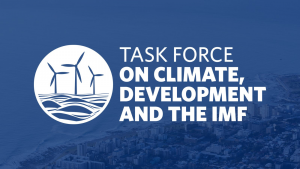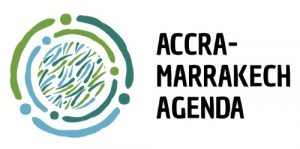
COLLECTIVE STATEMENT
Emergency Coalition for Debt Sustainability and Climate Prosperity
Recalling the Accra-Marrakech Agenda, energised by the Bridgetown Initiative 2.0, the Sustainable Debt Coalition Initiative and the Global Sovereign Debt Roundtable, We, the Finance Ministers of the V20 and other developing countries declare the following:
1. Debt distress and record highs in the cost of capital threaten to reverse development gains that we have achieved and jeopardise our ability to finance climate and development goals into the future. V20 economies have already suffered climate-induced losses amounting to $525 billion over the last twenty years. To avoid losing decades of human development and a spiralling of the climate crisis, the global financial architecture needs to evolve when it comes to debt and debt distress. Virtually all developing countries are facing new highs in the cost of capital, or debt distress, with a growing number of countries facing both. In either case, this phenomena makes it extremely difficult to mobilise the resources necessary to recover from the multiple shocks that have plagued the world economy in the past three years and to get on a path to a low carbon, resilient, and socially inclusive future.
2. The current architecture for debt relief needs reform and transformation. It does not enable all countries in distress to receive treatment, does not compel all creditor classes to participate, and is not linked to climate and development goals, but appears to only focus on stabilisation. Moreover, existing debt relief approaches fail to provide a timely, predictable, transparent and fair process of burden and risk sharing. Neither do they enable countries to mobilise the resources necessary for development positive climate action. Thus far, debt deals have not encouraged new investment into economies of developing countries, but have rather frozen public investment for the programme period. It is paramount that developing countries realise strategic investments grounded in national development priorities with the aim of promoting social, economic and climate objectives. These investments need to be supported by easy to access, concessional finance from development finance institutions, including multilateral institutions. This call is echoed by Bridgetown Initiative 2.0 to restore debt sustainability as soon as possible for the developing world.
3. Strengthen the regulatory and supervisory framework for Credit Rating Agencies to ensure that they incorporate the risks of climate change in their assessments and increase their accountability towards the economies significantly impacted by the quality of their assessments. Credit Ratings have a significant impact on sovereign issuers regarding terms of conditions and the costs under which they access debt markets.
4. The G20, the International Monetary Fund, the World Bank, governments, regional development banks, development finance institutions, credit rating agencies, private sector and stakeholders need a roadmap to reform and transform the sovereign debt architecture to align it with development and climate goals. The IMF, the World Bank, and the Indian G20 Presidency have launched the Global Sovereign Debt Roundtable (GSDR) with this goal in mind: to propose an evolution of the sovereign debt restructuring system, with all major parties around the table. It is likely to be a long-term process that touches on many key technical parts of the debt restructuring process. While it is mostly focused on resolving debt distress, much more ambition is needed to ensure rapid resolutions, return to new financing, and the participation of all creditors, all in order to trigger resilience building and growth prospects for developing countries.
5. Developing countries should speak with a unified voice to contribute to a new set of rules against the backdrop of a new climate insecure reality. In the same spirit as the V20 Group’s roadmap to the Accra-Marrakech Agenda (A2M) shared April 2023, it is critical that the international financial system makes debt work for climate vulnerable countries. Furthermore, given the climate-insecure future of developing economies, debt treatment should support the enhancement of climate resilience, the transition to climate-smart development, and inclusive debt-sustainability analysis that considers the investment needs of national climate strategies and plans such as Climate Prosperity Plans.
6. This coalition will meet regularly to coordinate our stances on technical issues. At the ministerial level, we will meet prior to GSDRs at the appropriate level in order to speak with coordinated voices. At technical levels, we will call our advisors and deputies to agree on building better climate- and growth-oriented Debt Sustainability Analyses, to foster consensus on comparability of treatment and other aspects of debt architecture reforms and transformations. The coalition will call on technical partners to support the process.
7. This coalition welcomes the proposal made by Colombia and other countries to establish a Global Expert Review on Debt, Nature and Climate to conduct a comprehensive assessment of the way in which the structure, volume and analysis of sovereign debt impacts the ability of low and middle income countries to conserve nature, to adapt to climate change and to decarbonize their economies, and how it can be made more sustainable, both fiscally and environmentally.
8. At Marrakech in October 2023, we will formally launch a coalition open to all developing countries and count on the partnership to triangulate the multilateral system, private sector (including credit rating agencies) and philanthropies for win-win solutions. Time is not on our side and the longer we take, the more inequity and injustice there is and it is evident by our communities and economies which are heavily impacted by climate events and crumbling under massive financial and social pressures to build back better and stronger. We will meet again during the V20 Ministerial XI on the margins of the World Bank/IMF Annual Meeting to propose specific changes to debt architecture.
TECHNICAL PARTNERS






